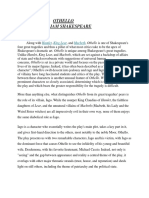0 ratings0% found this document useful (0 votes)
1 viewsAbout Othello
About Othello
Uploaded by
pathiragesenaliCopyright:
© All Rights Reserved
Available Formats
Download as PDF, TXT or read online from Scribd
About Othello
About Othello
Uploaded by
pathiragesenali0 ratings0% found this document useful (0 votes)
1 views7 pagesCopyright
© © All Rights Reserved
Available Formats
PDF, TXT or read online from Scribd
Share this document
Did you find this document useful?
Is this content inappropriate?
Copyright:
© All Rights Reserved
Available Formats
Download as PDF, TXT or read online from Scribd
Download as pdf or txt
0 ratings0% found this document useful (0 votes)
1 views7 pagesAbout Othello
About Othello
Uploaded by
pathiragesenaliCopyright:
© All Rights Reserved
Available Formats
Download as PDF, TXT or read online from Scribd
Download as pdf or txt
You are on page 1of 7
About Othello
The Original Story
Shakespeare used existing stories as the basis for many of the
plots of his plays. He took some from history (Macbeth, for
example is based on Holinshed's Chronicles) and some from
stories that were circulating in books at the time. Shakespeare's
tragedy Othello, written and performed in 1604 and first printed
in 1622, is based on a tale in Cinthio's Hecatommithi (1565), "Un
Capitano Moro." What's interesting to modern readers is how
Shakespeare adapted these stories, turning bare narratives into
gripping drama.
The original tale, "Un Capitano Moro," concerns an unnamed
Moor who marries a beautiful lady, Desdemona, despite her
parents' opposition. The Moor and Desdemona live happily in
Venice, and the Moor is appointed commander of troops sent to
the garrison at Cyprus. He takes his wife with him.
The Moor's wicked ensign falls in love with his commander's wife,
Desdemona. The ensign is afraid he will be killed if the Moor
discovers his secret, and all his efforts to impress Desdemona go
unnoticed because she only thinks of her husband. The ensign
imagines that she loves someone else, a handsome young captain
who is also in Venice, and his love turns to bitter hatred. He plots
to kill the captain and revenge himself on Desdemona.
The ensign bides his time. He sees his opportunity when the
Moor degrades the captain for wounding a soldier and
Desdemona tries to make peace between her husband and the
captain. The ensign hints that Desdemona has her own reason to
want the captain reinstated. When his wife claims that the
demotion was an overreaction, the Moor becomes very angry and
suspects that his ensign had spoken truthfully. When the ensign
tells the Moor that the captain told him of the affair, the Moor
demands to see proof of it.
The ensign and his wife have a daughter aged about three, and
one day when Desdemona visits their house, he puts the child on
her lap. As Desdemona and the child play, the ensign steals one of
her handkerchiefs. The ensign then leaves the handkerchief on the
bed of the young captain, who recognizes it and goes to return it
to Desdemona. When the Moor answers his knock at the door,
the captain runs away, but not before the Moor recognizes him.
Later, the ensign laughs and jokes with the captain where the
Moor can see them; he then tells the Moor him that he and the
captain were talking about the captain's love affair with
Desdemona and a handkerchief that she had given him. The
Moor, believing that the handkerchief constitutes proof of his
wife's infidelity, demands it of his wife, who, of course, cannot
produce it. The Moor decides that he must kill his wife and plots
with the ensign to kill both his wife and the captain.
The ensign, after a large payment, waylays the captain, attacks him
with his sword, and manages to wound him on the leg.
Desdemona is tearful to see the captain in pain, and the Moor and
the ensign beat her to death with a sand filled stocking. Then they
pulled down the rotten timber ceiling on her, making it appear
that the falling roof had killed her. The Moor, distracted with grief
for his dead wife, turns against the ensign and cashiers him.
The ensign now plots to ruin the Moor. He goes back to Venice
with the captain, now one-legged, and they accuse the Moor of
injuring him and murdering Desdemona. The Moor is arrested,
refuses to speak under torture, and is banished and later killed by
Desdemona's family. The ensign pursues his career of villainy with
other victims, but in the end is arrested and dies under torture.
Shakespeare's Version
In creating his tragedy Othello, Shakespeare tightened and
dramatized the original story in several ways. The plot is
concentrated in time and space, other characters are introduced to
give, in several places, a double motive for an action. Iago now
plots to destroy Othello, for a variety of motives, rather than
Desdemona. Roderigo provides Iago with a useful dupe; his
existence allows Iago to outline his wicked plans in conversation
rather than soliloquy and to demonstrate his capacity for ruthless
manipulation. Emilia provides a running commentary on Iago and
his character, which she ascribes to all men. She innocently picks
up the handkerchief, allowing the elimination of the daughter
from the plot, and is a quick source of the information that finally
condemns Iago.
Shakespeare also significantly altered the story's ending,
concentrating revenge, love, and despair in the final dramatic
scene of the play: murder in the marriage bed, followed
immediately by revelation and grief. Shakespeare's Othello
murders his wife alone, face to face, by strangulation, struggling
with his love for her to the end.
By concentrating the action and developing the characters into
fully realized human beings, with their own names, personalities,
and ways of looking at the world, Shakespeare created a tragedy
whose beauty and pathos is universal.
Othello Summary
In Venice, Roderigo complains to Iago that, despite the money he's
given Iago to help him woo Desdemona, she's eloped with the Moorish
general Othello. Iago responds that he too hates Othello, for whom he
works as a standard-bearer: Othello chose Cassio, rather than Iago, to be
his lieutenant. The two men go to the home of Desdemona's father, the
senator Brabantio, and rouse him with graphic descriptions of his
daughter having sex with the Moor. Brabantio, enraged, interrupts
Othello as he receives an urgent message from the Duke of Venice, and
accompanies Othello see the Duke. In front of the Duke, Brabantio
accuses Othello of having used magic to seduce Desdemona. Othello
responds that it was stories of his exciting life history and military
bravery that won Desdemona. When summoned, Desdemona supports
Othello's story. Brabantio grudgingly blesses the newlyweds. The Duke
then sends Othello to lead a fleet of Venetians to defend Cyprus from a
Turkish attack. Desdemona accompanies him. Iago reassures Roderigo
that he will still win Desdemona in the end, then privately admits that
he's just using Roderigo for money while he plots his own revenge.
When the Venetians arrive in Cyprus, the governor Montano reports that
a storm at sea has drowned the Turkish fleet, eliminating the military
threat. Iago quickly hatches a plan to make Othello believe that
Desdemona has been unfaithful to him with either Cassio or Roderigo.
That night, while Othello and Desdemona go to bed to consummate
their marriage, Iago succeeds in getting Cassio drunk. He then goads
Roderigo into provoking Cassio, starting a brawl. Disgusted, Othello
demotes Cassio.
Meanwhile, Iago convinces Desdemona to try to get Othello to reinstate
Cassio. Iago then uses Desdemona's requests that he be merciful to
Cassio to make Othello suspect that Desdemona is cheating on him with
Cassio. Othello, takes the bait, repeatedly praising Iago for his honesty.
Later, when Desdemona accidentally drops a handkerchief that Othello
had given to her as a love-token, Emilia gives it to Iago, who had long
asked her to steal it for him. Iago then plants it in Cassio's room.
Othello, upset, demands that Iago show him proof of Desdemona's
infidelity. Iago responds that he has heard Cassio fantasize lewdly about
Desdemona in his sleep and that he has seen Cassio wipe his mouth with
Desdemona's handkerchief. Othello promotes Iago to the status of
lieutenant and orders him to kill Cassio within three days. Othello then
goes to Desdemona's room, and asks her for the handkerchief.
Desdemona, who had been searching for the handkerchief, admits she
can't find it. Othello storms off. Meanwhile, Cassio's mistress, the
prostitute Bianca, comes to his quarters. Cassio asks her to make a copy
of a handkerchief he's recently found in his room, because he admires it.
Iago continues to spur Othello's jealousy. When he reports that Cassio
has admitted to sleeping with Desdemona, Othello falls into an epileptic
fit. Iago urges Othello to hide while he questions Cassio about
Desdemona. In fact, he asks Cassio about Bianca, causing Cassio to
laugh. Watching from afar, Othello grows increasingly furious. Then,
Bianca shows up, and throws Desdemona's handkerchief at Cassio,
accusing him of having it from another whore. After Cassio and Bianca
leave, Iago easily persuades Othello to kill Desdemona. Iago promises to
take care of Cassio himself. He then convinces Roderigo that if Cassio
were to die, Othello would have to remain in Cyprus, leaving
Desdemona in Venice for Roderigo. Iago instructs Roderigo to wait
outside Bianca's house that night and kill Cassio when he leaves.
That night, Iago sets Roderigo up to kill Cassio as planned. When Cassio
exits Bianca's house, Roderigo attacks him; both are wounded.
Overhearing Roderigo's cries for help, Othello believes that Cassio is
dead and is impressed by Iago's loyalty. Meanwhile, Iago goes to
Bianca's; finding Cassio wounded, he stabs Roderigo, killing him (and
thus assuring that his secret will not be revealed). Iago then calls the
others, including Bianca, whom he arrests, accusing her of having
conspired with Roderigo. While this is going on, Othello arrives at
Desdemona's chamber. Enchanted by her beauty, he nonetheless resists
her pleas to spare her life, and he smothers her with a pillow. Emilia
arrives to tell Othello that Roderigo is dead and Cassio alive, when she
hears Desdemona's dying cries.
When Emilia demands why Othello has killed Desdemona, Othello
explains how Iago proved to him that Desdemona slept with Cassio. As
Montano, Iago, and Gratiano, a relative of Brabantio's all arrive, Emilia
accuses Iago of lying and explains that she stole this from Desdemona at
her husband's behest. Othello attacks Iago. In the uproar, Iago stabs and
kills Emilia, then flees. Montano and Gratiano disarm Othello, then
chase down Iago. When he is dragged back in their custody, Othello
wounds him before being disarmed again. Letters found on Roderigo's
corpse reveal the full extent of Iago's plots; he himself refuses to explain
himself. Othello draws a hidden dagger and, after a speech, kills himself.
You might also like
- (G) New SAT Grammar Workbook (Advanced Practice) - (Student Book)Document99 pages(G) New SAT Grammar Workbook (Advanced Practice) - (Student Book)유시호90% (10)
- Unorthodox Chess Openings by Eric SchillerDocument531 pagesUnorthodox Chess Openings by Eric SchillerSergioD.Cattarin71% (7)
- Masters of Tradition 2024Document17 pagesMasters of Tradition 2024The Journal of MusicNo ratings yet
- OthelloDocument3 pagesOthelloMary Jane0% (1)
- Risen 2 WalkthroughDocument70 pagesRisen 2 WalkthroughdresdelmineNo ratings yet
- Othello SummariesDocument5 pagesOthello SummariesYasmine AbdouNo ratings yet
- Introducction MD 80Document21 pagesIntroducction MD 80JOSUÉ CABRERANo ratings yet
- Othello SummaryDocument6 pagesOthello Summaryapi-302050882100% (1)
- 07 Alma Llanera Clarinete 1Document3 pages07 Alma Llanera Clarinete 1Irune Fuente AbadNo ratings yet
- OthelloDocument1 pageOthelloLivia ElenaNo ratings yet
- Othello Companion (Includes Study Guide, Historical Context, Biography, and Character Index)From EverandOthello Companion (Includes Study Guide, Historical Context, Biography, and Character Index)Rating: 2 out of 5 stars2/5 (2)
- Making Sense of Othello! A Students Guide to Shakespeare's Play (Includes Study Guide, Biography, and Modern Retelling): Making Sense, #2From EverandMaking Sense of Othello! A Students Guide to Shakespeare's Play (Includes Study Guide, Biography, and Modern Retelling): Making Sense, #2Rating: 3 out of 5 stars3/5 (1)
- Othello SynopsisDocument2 pagesOthello SynopsisMariam Abdel-RazekNo ratings yet
- Seminar Othello - William ShakespeareDocument18 pagesSeminar Othello - William ShakespeareandersonloureiroNo ratings yet
- Othello SummaryDocument2 pagesOthello SummaryAhmad HasanNo ratings yet
- Othello (Lavoro Di Gruppo)Document7 pagesOthello (Lavoro Di Gruppo)Maria JoseNo ratings yet
- OthellloDocument4 pagesOthellloRajamohanNo ratings yet
- Othello by William Shakespeare (Book Analysis): Detailed Summary, Analysis and Reading GuideFrom EverandOthello by William Shakespeare (Book Analysis): Detailed Summary, Analysis and Reading GuideNo ratings yet
- Othello SummaryDocument2 pagesOthello SummaryelenibacousiNo ratings yet
- Othello Shakespeare's DramaDocument3 pagesOthello Shakespeare's DramaSadiaNo ratings yet
- Essay: Othello: 'Othello'' Is A Tragedy by William Shakespeare, Written in 1603Document2 pagesEssay: Othello: 'Othello'' Is A Tragedy by William Shakespeare, Written in 1603edona mehmetiNo ratings yet
- OthelloDocument40 pagesOthelloWoodpeckertuckerNo ratings yet
- Othello Begins On A Street in Venice, in The Midst of An Argument Between Roderigo, A Rich ManDocument3 pagesOthello Begins On A Street in Venice, in The Midst of An Argument Between Roderigo, A Rich Manahmad1200No ratings yet
- Othello SummaryDocument51 pagesOthello SummaryDavid W ReynosoNo ratings yet
- Othello Grade12 SummaryDocument5 pagesOthello Grade12 SummaryChey1242No ratings yet
- Enotes Othello SummaryDocument2 pagesEnotes Othello SummaryDev kothariNo ratings yet
- 21 Othello Key Scenes 7Document2 pages21 Othello Key Scenes 7Ciara DennehyNo ratings yet
- OthelloDocument2 pagesOthelloRazvan ConstantinNo ratings yet
- VeniceDocument23 pagesVenicejebastinsweetysweetyNo ratings yet
- Roderigo Iago Desdemona Othello Cassio Brabanzio: Plot OverviewDocument5 pagesRoderigo Iago Desdemona Othello Cassio Brabanzio: Plot Overviewradgull100% (1)
- OthelloDocument2 pagesOthelloafrooz456No ratings yet
- OthelloDocument21 pagesOthelloIftikhar Hussain RizviNo ratings yet
- OtheloDocument34 pagesOtheloabdur rehmanNo ratings yet
- OthelloDocument2 pagesOthelloMANASI AHIRE [SOUS-EO054]No ratings yet
- Resumen de OthelloDocument3 pagesResumen de OthelloantoflaviaalvarezNo ratings yet
- Othello VijayDocument7 pagesOthello VijayJayaprabhu PrabhuNo ratings yet
- Othello NotesDocument16 pagesOthello NotesDavid Scullion100% (5)
- Othello, Shakespeare: Act IDocument3 pagesOthello, Shakespeare: Act ISara MeneghettiNo ratings yet
- Othello NotesDocument5 pagesOthello NotesKayla VorsterNo ratings yet
- OthelloDocument3 pagesOthelloTheaaaNo ratings yet
- Othello, Henry IV -Unit III, IV Essays- Tansche- Shakespeare StudiesDocument17 pagesOthello, Henry IV -Unit III, IV Essays- Tansche- Shakespeare StudiesFemSamNo ratings yet
- Othello Resources - Shakespeare's Globe EducationDocument12 pagesOthello Resources - Shakespeare's Globe Educationlyra van tonderNo ratings yet
- OTHELLO Plot SummaryDocument1 pageOTHELLO Plot Summaryao2012No ratings yet
- Othello SummaryDocument3 pagesOthello Summaryapi-236470498No ratings yet
- Gp Nep III Sem b.a. English OthelloDocument17 pagesGp Nep III Sem b.a. English Othellosachi88848No ratings yet
- Othello Play SummaryDocument7 pagesOthello Play SummaryjawiNANANo ratings yet
- Othello Short Questions PDFDocument12 pagesOthello Short Questions PDFNadeem ul Hassan67% (6)
- Othello SummaryDocument4 pagesOthello SummaryChirag HablaniNo ratings yet
- Othello Layout FINALDocument14 pagesOthello Layout FINALSandra MarkovicNo ratings yet
- Othello TimelineDocument3 pagesOthello TimelineHo LingNo ratings yet
- Othello Plot SummaryDocument13 pagesOthello Plot Summaryapi-141589499100% (1)
- Othello and Memo 2024Document39 pagesOthello and Memo 2024mphuganamakhadziNo ratings yet
- Basic Plot Overview of Othello'Document2 pagesBasic Plot Overview of Othello'William NguyenNo ratings yet
- Othello SummaryDocument11 pagesOthello Summaryaditi_123456No ratings yet
- The Tragedy of Othello, The Moor of Venice: Soraya LaraDocument6 pagesThe Tragedy of Othello, The Moor of Venice: Soraya LaraMinigirlNo ratings yet
- OTHELLO - ACT-SCENE SUMMARIESDocument12 pagesOTHELLO - ACT-SCENE SUMMARIESCilla VenterNo ratings yet
- Othello Performance SynopsisDocument1 pageOthello Performance Synopsisapi-461350618No ratings yet
- Othello StudyguideDocument30 pagesOthello Studyguidejoshuameyer066No ratings yet
- OthelloDocument4 pagesOthelloakyshadallasNo ratings yet
- Othello Actwise Short SummaryDocument15 pagesOthello Actwise Short Summaryshankar shankarNo ratings yet
- Othello General NotesDocument3 pagesOthello General NotesSofia NietoNo ratings yet
- Othello 2025 Plus MemoDocument35 pagesOthello 2025 Plus MemoezamantulingibaNo ratings yet
- Act 4 Othello QuestionsDocument3 pagesAct 4 Othello Questionsgsanchula12100% (1)
- Detailed Othello Summative Note of ACT'S AND SCENE'SDocument17 pagesDetailed Othello Summative Note of ACT'S AND SCENE'SdjpichNo ratings yet
- The Tragedy of Othello Play SummeriesDocument3 pagesThe Tragedy of Othello Play Summerieskrivera_263848No ratings yet
- Airblue Report EditedDocument16 pagesAirblue Report EditedMaria Mohammed100% (1)
- Lesson 5 Some of The Most Useful Ideas Come From NatureDocument71 pagesLesson 5 Some of The Most Useful Ideas Come From Nature414-04甘鎧達No ratings yet
- ASL - VFTT 10Document16 pagesASL - VFTT 10deitti333No ratings yet
- Metpol PresentationDocument5 pagesMetpol PresentationvuldaroqNo ratings yet
- Introduction To ProbabilityDocument10 pagesIntroduction To ProbabilityDaniel Naoe FestinNo ratings yet
- WorldLab 9th Prototype FullDocument11 pagesWorldLab 9th Prototype FullRitvik Singh SabharwalNo ratings yet
- Floor Box Catalogue 2021Document9 pagesFloor Box Catalogue 2021TomNo ratings yet
- Kat Craddock PortfolioDocument15 pagesKat Craddock PortfoliokatNo ratings yet
- STD 3 Term 3 Capa NotesDocument18 pagesSTD 3 Term 3 Capa NotesOná Lé ThataNo ratings yet
- Ottmar Balleau X 2Document14 pagesOttmar Balleau X 2Александр МинисNo ratings yet
- Ghost Brothers LibrettoDocument47 pagesGhost Brothers LibrettoAdam Graham100% (1)
- Bài Tập Bổ Trợ Wonderful World 4 Kì 2Document116 pagesBài Tập Bổ Trợ Wonderful World 4 Kì 2Nguyễn Quỳnh AnhNo ratings yet
- Very Imp ProjectDocument52 pagesVery Imp ProjectSamik DasguptaNo ratings yet
- Lotus Garden HotelDocument62 pagesLotus Garden Hotelpaulriqs100% (3)
- Ball Sports CrosswordDocument3 pagesBall Sports Crosswordmariam mullaNo ratings yet
- Ejercicio 9Document7 pagesEjercicio 9Pérez De Aquino Jesus AmadoNo ratings yet
- Michael J. Carney: Marketing, Sales & Operations C-Level ExecutiveDocument2 pagesMichael J. Carney: Marketing, Sales & Operations C-Level ExecutiveBrian HarrisNo ratings yet
- Future of PoledanceDocument16 pagesFuture of PoledanceOscar PoulonNo ratings yet
- Nappy Wrapper TubDocument2 pagesNappy Wrapper TubAllen MitchellNo ratings yet
- Revisid Testing Protocols Inbound and Outbound Travels-30 Sep 2021 FinalDocument5 pagesRevisid Testing Protocols Inbound and Outbound Travels-30 Sep 2021 Finalzain.szrnNo ratings yet
- Song Activity HappyDocument5 pagesSong Activity HappyNadiah Dwi NurhasanahNo ratings yet
- Da7217 DatasheetDocument168 pagesDa7217 DatasheetChrisNo ratings yet
- LO2 Prepare Vegetable DishesDocument44 pagesLO2 Prepare Vegetable DishesReynold CawalingNo ratings yet
- Viva La Vida Coldplay CelloDocument2 pagesViva La Vida Coldplay CelloMurilo CesarNo ratings yet

























































































